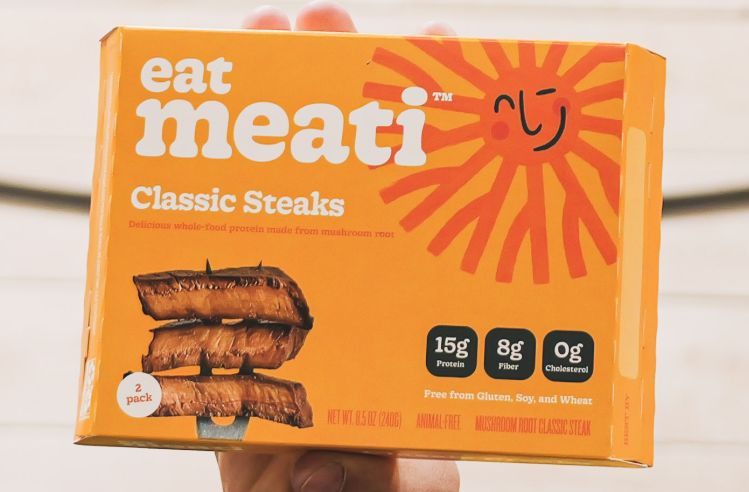Alt meat startup Meati Foods has been hit with a putative class action lawsuit alleging it falsely advertises its cutlets and steaks as ‘made from mushroom root’ when they are in fact made from a strain of filamentous fungus called Neurospora Crassa, a type of mold.
In a complaint* filed in the Eastern District of California, plaintiff Serena Caldeira alleges that “Meati products are not made from mushrooms roots, nor are they made from any part of a mushroom. Specifically, the main ingredient in Meati products is Neurospora Crassa, a red mold that commonly grows on bread.”
Caldeira adds: “Meati’s internal research showed that consumers would not purchase its products if Meati disclosed its products’ main ingredient is mold, and/or customers would not pay the higher prices that Meati charges for its products if this fact were disclosed.”
The complaint goes on to allege that “consuming high concentrations of mold can cause severe allergic reactions in members of the consuming public and can potentially lead to death,” although it does not provide any evidence that the strain of fungus used by Meati Foods causes allergic reactions or presents any food safety issues.
Meati Foods has not yet submitted a GRAS (Generally Recognized as Safe) notice to the FDA outlining allergenicity data for N. Crassa (editor’s note: most foods containing proteins including soy, egg, and milk can cause allergic reactions in some consumers).
However, The Better Meat Co, which also uses a strain of Neurospora Crassa in its ‘Rhiza mycoprotein’ meat alternatives, recently secured a ‘no questions’ letter from the FDA in response to its determination that the product was safe.
In its GRAS notice, the Better Meat Co noted that, “No evidence was identified which suggests that proteins from N. crassa represent any risk to consumers that is not matched by the equal low-level identity matches from widely diverse taxa of divergent organisms. N. crassa is akin to other common fungi in the human diet. The long history of safe consumption of Neurospora as food in other countries serves as corroboration of the GRAS position based on scientific procedures.”
The FDA responded with a letter saying that, “We have no questions at this time regarding BMC’s conclusion that fungal protein is GRAS under its intended conditions of use.”
Quorn settlement
The case vs Meati Foods mirrors a high-profile class action filed in 2016 against Quorn Foods, which was accused of misleading shoppers by suggesting its meat alternatives—which are made from a different type of fungus called Fusarium Venenatum—were “substantially similar to a mushroom.”
Quorn ultimately came to a settlement in which it agreed to add disclosures to labels stating that, “Mycoprotein is a mold member of the fungi family. There have been rare cases of allergic reactions to products that contain mycoprotein.”
According to Caldeira, “Meati’s deceptive conduct is far worse than the conduct at issue in Quorn because Meati is falsely stating, not just implying, that its products are made from mushrooms, and it is doing so on the front of every package.”
She added: “If defendants had accurately disclosed that Meati products were made of mold and were not made from any part of a mushroom, the market value of those products would be substantially less than the prices paid by plaintiff and the [proposed] California class.”
The case reflects the communications challenges faced by players in the ‘mycoprotein’ space, who are using different varieties of fungus, some of which are more familiar to shoppers than others. The fungus used by Quorn, for example, was originally found growing in soil samples in Buckinghamshire in the 1960s, and does not have fruiting bodies that consumers might recognize as ‘mushrooms.’
‘Over the past few months, we’ve been moving towards calling Meati exactly what it is: mycelium’
Founded in 2015 by engineers Dr. Justin Whiteley and Dr. Tyler Huggins, Boulder-based Meati Foods recently started production at its “Mega Ranch” in Thornton Colorado, which will ultimately be able to produce 40 million pounds a year (the equivalent of about 151 million 120g steaks).
The firm, which now sells products in more than 6,000 stores across the US and says it has strong repeat rates, has recently moved away from using the term mushroom root, a phrase that no longer appears on its website, and has also begun the process of updating its packaging, well before the lawsuit was filed.
A spokesperson told AgFunderNews: “Over the past few months, we’ve been moving towards calling Meati exactly what it is—mycelium—out of a spirit of simplicity and transparency. Consumers are savvy, and even though they might not have heard of mycelium in the past, we believe that once they taste and understand its health benefits, they’ll adopt the new language. Mycelium is a powerhouse; it’s a great nutritious product that meat eaters, vegetarians and vegans alike can enjoy.”
*The case is Serena Caldeira vs. Emergy inc. doing business as Meati Foods. 2:24-cv-01775





